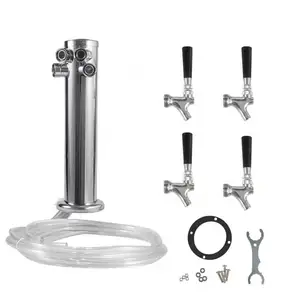
All categories
Featured selections
Trade Assurance
Buyer Central
Help Center
Get the app
Become a supplier

(39 products available)














































tapping beer barrels are essential components in the world of packaging, specifically designed for the storage and transportation of beverages. These containers are typically crafted from durable metals, such as stainless steel or aluminum, ensuring they can withstand the rigors of both transportation and storage. tapping beer barrels are engineered to maintain the quality of the beverages they contain, protecting them from external elements and preserving their freshness. With the rise in popularity of craft beers and microbreweries, the demand for high-quality tapping beer barrels has surged, making them a crucial element in the supply chain for beverage companies worldwide.
There are various types of tapping beer barrels available, each serving specific needs in the beverage industry. The most common types include the half barrel, quarter barrel, and sixth barrel kegs. Half barrel kegs, often referred to as full-size kegs, have a capacity of approximately 15.5 gallons and are widely used in commercial settings. Quarter barrel kegs, also known as pony kegs, hold around 7.75 gallons, making them suitable for smaller events and venues. Sixth barrel kegs, with a capacity of approximately 5.16 gallons, are ideal for home use and small-scale distribution. Additionally, there are specialized tapping beer barrels designed for particular types of beverages, such as stout kegs with nitrogen valves for dispensing darker ales.
tapping beer barrels serve multiple functions, foremost being the preservation and storage of beverages. They are equipped with features that ensure the contents remain fresh and carbonated. The pressurized environment within tapping beer barrels prevents oxidation, which can degrade the quality of the beverage. Features such as integrated taps and couplers facilitate efficient dispensing, allowing for controlled and easy pouring. Some tapping beer barrels come with advanced cooling systems, ensuring that drinks are served at optimal temperatures. The robust construction of tapping beer barrels makes them reusable, providing an eco-friendly option for beverage storage.
The construction of tapping beer barrels involves the use of high-quality metals, primarily stainless steel and aluminum. Stainless steel is favored for its resistance to corrosion, durability, and ability to maintain the integrity of the beverage. Aluminum tapping beer barrels are lighter and offer excellent thermal conductivity, making them suitable for situations where temperature control is paramount. The interior of tapping beer barrels is often lined with protective coatings to prevent any metallic taste from affecting the beverage. Additionally, some tapping beer barrels are designed with recyclable materials, reflecting the industry's move towards sustainability.
Effective use of tapping beer barrels requires understanding their capacity and the environment in which they will be used. In commercial settings, larger tapping beer barrels are preferred for high-volume dispensing, while smaller kegs are ideal for personal use or small gatherings. Proper maintenance, including regular cleaning and sanitization, ensures the longevity and performance of tapping beer barrels. Additionally, when using tapping beer barrels for outdoor events, consider the need for cooling systems to maintain beverage temperature. Understanding the compatibility of taps and couplers is crucial for seamless operation. By selecting the appropriate tapping beer barrels for the occasion, users can enhance the beverage experience and optimize resource usage.
Choosing the appropriate tapping beer barrels involves considering various factors to ensure optimal performance and satisfaction. The first aspect to examine is the size and capacity of the keg. Depending on the volume of beverage you plan to store or serve, you may need a half barrel, quarter barrel, or sixth barrel keg. Larger kegs are suitable for commercial use, where high dispensing volumes are required, while smaller kegs can be ideal for personal gatherings or events. It's crucial to match the keg's capacity with your specific needs to avoid underutilization or wastage.
Material is another critical factor in selecting tapping beer barrels. Stainless steel is renowned for its robustness and resistance to corrosion, making it a popular choice for kegs that demand longevity and reliability. Alternatively, aluminum offers advantages in terms of weight and thermal conductivity, which can be beneficial for maintaining beverage temperature. Understanding the advantages and limitations of each material will help you make an informed decision that aligns with your priorities, be it durability or ease of handling.
When purchasing tapping beer barrels, consider factors such as size, material, and the specific requirements of the beverage being stored. It's important to assess the keg's capacity to ensure it matches your volume needs. Additionally, choosing the right material, such as stainless steel or aluminum, can impact the keg's durability and thermal properties. Compatibility with taps and couplers is also crucial for efficient dispensing.
tapping beer barrels maintain beverage freshness by creating a pressurized environment that prevents oxidation and contamination. This pressure ensures that the beverage remains carbonated and retains its original taste. The materials used in keg construction, such as stainless steel, also help preserve the beverage's quality by providing a barrier against external elements.
Yes, tapping beer barrels can be used for a variety of beverages, including cider, wine, and carbonated drinks. Specialized kegs are available for specific types of beverages, offering features such as nitrogen valves for dispensing stouts or ales. It's important to choose the right keg based on the beverage's characteristics to ensure optimal dispensing and preservation.
Reusable tapping beer barrels offer significant environmental benefits by reducing waste associated with single-use containers. Their durable construction allows for repeated use, minimizing the need for disposable packaging. Additionally, reusable kegs can provide cost savings over time, as they eliminate the need for frequent replacements and contribute to a sustainable beverage storage solution.
Maintaining tapping beer barrels involves regular cleaning and sanitization to ensure they remain in good condition. Proper maintenance helps prevent contamination and ensures the longevity of the keg. It's essential to follow recommended cleaning procedures, which may include washing with specific solutions or using sanitizing agents. Regular inspection of taps and couplers is also important to ensure efficient operation and dispensing.